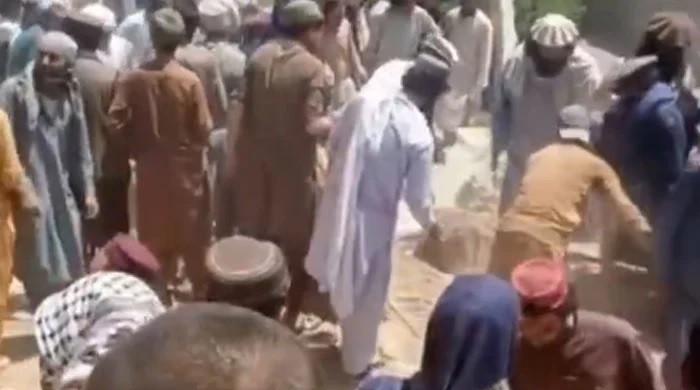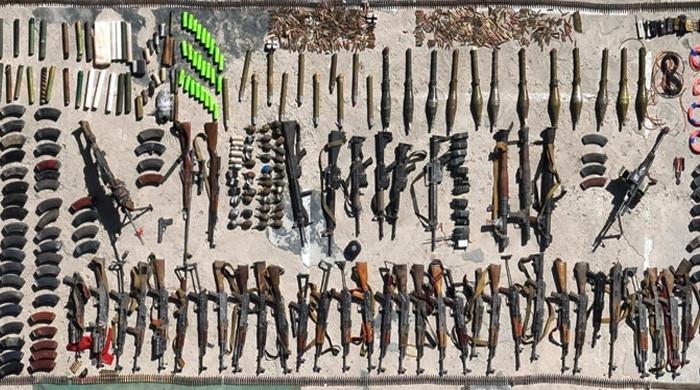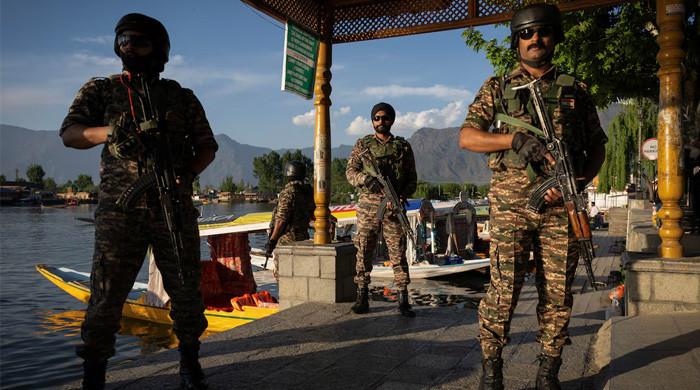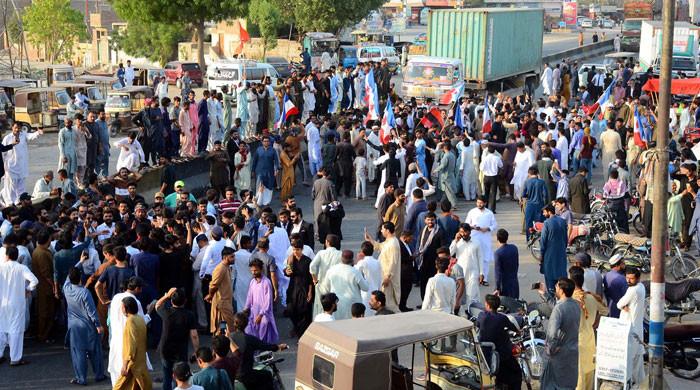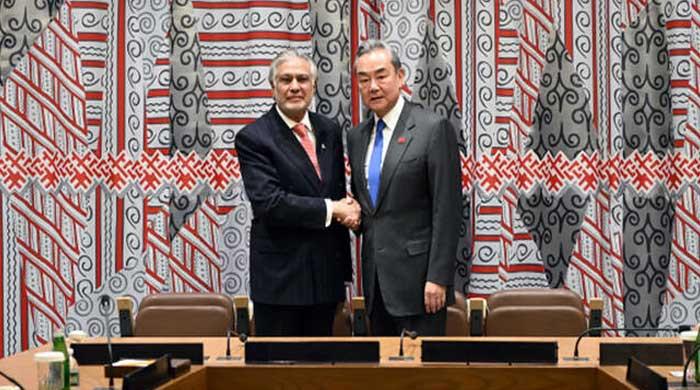KLF 2025 concludes with a call for empowering 'narratives from soil'
From discussions on persisting issues to book launches, KLF leaves audience eager for next year's edition
February 09, 2025

KARACHI: The Karachi Literature Festival (KLF) concluded with a shout out for upholding and endorsing the "narratives from the soil" as voices of people across the landscape.
Urban issues took centre stage in "Urban Dialogue: The Karachi Katchehri", had Murtaza Wahab, Mansoor Raza, and Bilal Hassan, addressing the challenges of Karachi’s governance and infrastructural issues. The session was moderated by Mahim Maher.
Insightful discussions on pressing national and global matters continued to engage the audience. "Pakistan-Bangladesh Relations: A Reset" with Ikram Sehgal and Salma Malik, explored the changing paradigms between the two nations.
Another crucial conversation, "Pakistan’s Population: Time Bomb or Dividend?" brought together experts Azra Fazal Pechuho, Lubna Naz, Rehana Ahmed, and Khalid Masud. Moderated by Naeem Sadiq, the panel discussed the challenges and opportunities posed by Pakistan’s demographic trends.
The vital issue of sustainability in business was explored in "Integrating Impact and Sustainability into Business, Investment, and Life", moderated by Ali Habib, the panelists included Martin Dawson, Maya Inayat Ismail, and Qasim Ali Shah.

A dynamic conversation titled "Have Electronic and Social Media Eroded the Quality of Political Debate?" saw prominent voices of Azhar Abbas, Amber Rahim Shamsi, Shehzad Ghias Shaikh, and Faisal Subzwari debating the role of modern media and social impact with Nadeem Farooq Paracha.
Acclaimed novelist Kamila Shamsie took the stage in "Weaving Worlds with Words", conversing with Hasan Zaidi about her writing journey. A tribute session, "Ode to Our Fathers", celebrated the legacies of literary figures such as Hameed Akhtar and Talat Hussain, with personal reflections from Saba Hamid and Tazeen Hussain, moderated by Harris Khalique.
Meanwhile, the rise of television and the constant strife between art and popularity was explored in "Chhoti Screen ki Bari Fatoohaat", featuring Noorul Huda Shah, Saba Hamid, Nadeem Baig, and Sarmad Khoosat, moderated by Shaista Lodhi.
The literary discourse acknowledging the giants of Urdu literature today, "Urdu ki Taza Bastiaan" featured celebrated poets and authors Iftikhar Arif, Harris Khalique, and Ashfaq Hussain, moderated by Zarminae Ansari.
Poetry enthusiasts were treated to "Kuch Ghazalain, Kuch Nazmain", where Moazzam Ali Khan shared his work, moderated by Maya Khan. Karachi’s literary and poetic heritage was explored in "Karachi: Kahaaniaan aur Nazmain", featuring Raja Shehzad, Sajjad Ahmed, and Afzal Ahmad Syed, with Peerzada Salman as moderator.
A session on Sindhi Sufi poetry, "Sachal, Sami, Lateef", brought together scholars Jami Chandio, and Madad Ali Sindhi, moderated by Sher Muhammad Mehrani. Young poets took centre stage in "Shaairi ke Rung, Jawanon ke Sung", led by Ambareen Hasib Ambar and Abdul Rehman Momin, featuring Ali Zaryoun, Umair Najmi, Dilawar Ali Aazar, Naeem Sameer, Sadiq Marri, Zahida Raeesi, Amar Pirzado, Sabeela Inam Siddique, and Imtiaz Danish.
The session "Crime Fiction and the Pursuit of Justice" brought bestselling author Omar Shahid Hamid into conversation with Tooba Masood-Khan.
Environmental justice and literature intersected in "From Chapters to Change: Literature and Environmental Justice", with Uzma Aslam Khan, Tariq Alexander Qaisar, and Saba Pirzadeh exploring the evolving ambit. The session was moderated by Framji Minwalla.

Continuing the limelight on performing arts, the session "Emergence of Urdu Rap in Pakistan" featured Arshad Mahmud, Babar Mangi, and Ash Rohan. Moderated by Anoushey Ashraf, the panel discussed the growth of this genre.
Education was a key theme, with experts discussing crucial reforms in "Call to Action: Transforming Education in Pakistan", featuring Farid Panjwani, Shahid Siddiqui, Pervez Hoodbhoy, Faisal Mushtaq, and Myra Murad Khan, moderated by Faisal Bari.
The future of teaching was explored in "New Directions in Teaching and Teacher Education", with Anjum Halai, Mohammad Ali Shaikh, Salma Alam, and Khadija Bakhtiar, moderated by Neda Mulji.
Technology’s role in education was discussed in "The Role of AI in Step-Changing Educational Outcomes in Pakistan" featuring Salma Alam, Hammad Malik, and Zeeshan Hassan. The session was moderated by Khurram Jamali.
The "Youth Pavilion" featured interactive and entertaining sessions, including "Theatre Fun and Games" with Atif Badar, "Mind Twisters: The Thinking Zone" with Amna Ghulam Hussain, "Music and Dance" with Badar, and "Story Time" by Aunty Tashi.
Classic children’s songs were revived in "Geeton ki Mehfil: Sohail Rana’s Famous Songs" by Badar. The engaging theatrical performance" Unfit Hall hai Dunya mere Agay: Grips Theater" was led by Khaled Anam and team. Young talent was celebrated in "Young Authors and Poets" with Scherazade Jamali.
KLF’s final day also celebrated the launch of 14 more books, including Poems: On Being Human, In the New Century: An Anthology of Pakistani Literature in English, Of Reason, Romance and Ruin: A Conceptual History of the ‘Pakistan Ideology’, and the Urdu translation of the 2024 Nobel Prize for Literature-winning novel, The Vegetarian by Han Kang.
Other book launches included Soliloquies? Existing on Earth, A Woman on a Suitcase, Akbar in Wonderland, No Funeral for Nazia, Coining A Wishing Tower, Kulyaat-e-Ahmed Faraz, Yeh Meri Ghazlain, Yeh Meri Nazmain, Forgotten Images — Postcards of Pre-Pakistan 1890-1947, A Man with a Pen, and Bemausami Khwahishain.

A special launch of Journey Through Chaos featured a panel discussion with Saeed Ghani, Mazhar Abbas, Mushahid Hussain Syed, and Wusatullah Khan, moderated by Ahmed Shah.
The closing ceremony featured notable speakers including former senator Khushbakht Shujaat and journalist Mishal Husain. Emphasising the importance of preserving cultural stories and heritage, Mishal stated, "Art and Literature define and develop a society, and KLF is one of the best conduits of social progress".
Former senator Shujaat reiterated the need for public and private partnerships to make such events get optimal space in Karachi. "Karachi needs to empower such platforms for true democratic principles to strengthen".
The day’s finale was the traditionally mesmerising Qawwali performance by the maestros Ustad Farid Ayaz and Ustad Abu Muhammad.
Concluding on an energetic and uplifting note, the KLF left the audience feeling inspired and eager to attend next year’s celebrations.




